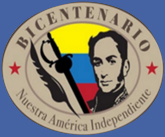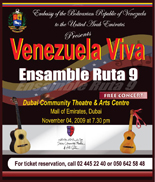
Bolivarian Republic of Venezuela
Embassy in the UAE
Land Reform in VenezuelaSince the arrival of the Spanish in 1492, notes Braulio Alvarez, long-time peasant activist and former director of Venezuela's National Land Institute, "we have been struggling for equality, justice, and an end to exploitation." Access to land rights is a key component in this struggle for human dignity. Under the government of President Hugo Chávez, peasants are recovering not only their lands, but also their human rights and dignity. The Venezuelan government has implemented policies that recognize peasants' ancestral rights. Peasant struggles have resulted in significant gains for equality and social justice. A History of Inequality Venezuela has had an extremely unbalanced land ownership system, with 5 percent of the population-owning three-quarters of the agricultural land. This leaves most of the rural population poor, landless, and unable to support them. Three-fifths of agricultural laborers do not own any of the land they work. Historically, land reform programs designed to address these imbalances have often failed because they did little more than give peasants land, without providing access to financial credit, technical expertise, or marketing assistance, all of which are necessary for success. Rather than increasing Venezuela's ability to feed itself, programs implemented in the 1960s with the support of the United States and its "Alliance for Progress" only deepened the country's economic dependence. Critics have viewed this as a flawed development approach that industrialized agricultural production and made it capital-intensive while failing to support the peasantry with education and training. Rather than leading to a fairer distribution of land, it resulted in peasants losing access to their lands. The National Land Institute In 1998, Venezuelans overwhelmingly elected Hugo Chavez to the Presidency. A year later, they approved a new constitution addressing the rights of rural peasants to land and of citizens to food security. To avoid the failures of previous agrarian reform programs, Congress enacted the Law on Land and Agricultural Development in November 2001. The law instituted a cap on the size of landholdings, taxed land that was not in production, and provided for the distribution of land to landless peasants. Main goals of this legislation were to address issues of social injustice and to increase agricultural production. This legislation created three new institutions to carry out these goals: one to administer land tenancy, a second to provide technical and infrastructure aid, and a third to assist with marketing strategies. The most significant of these institutions, created in January 2002, is the National Land Institute (Instituto Nacional de Tierras, INTI). Through such legislation, the Chávez government is demonstrating the political will to bring about concrete, positive changes in the countryside. Food Sovereignty In order to speed up the process of agrarian reform, on February 4, 2003 Hugo Chávez signed a presidential decree formally launching Plan Zamora as part of the National Land Institute. The goal of the program is to support sustainable agricultural development based on a philosophy of a just distribution of land in accordance with values of equality and social justice. Its main objective is to distribute land to small and medium-sized producers. Plan Zamora is key to achieving the government's goals of food security, economic self-sufficiency, and breaking a dependency on imported goods. The Venezuelan government named this land reform program after Ezequiel Zamora, a revolutionary liberal leader from the nineteenth century who advocated a far-reaching land reform program for the peasantry. Just as Chávez has drawn on independence leader Simón Bolívar to inform the ideals of the Bolivarian Revolution, Ezequiel Zamora's legacy emerges in Venezuela's agrarian reform program. Most of the land distributed under Plan Zamora was already owned by the government. Before acquiring land, a participant needs to apply for a "carta agraria" (agrarian deed) from the National Land Institute (INTI) that verifies qualifications including demonstration of economic need and willingness to work an assigned plot of land. With this deed, an applicant can occupy a plot and receive preferential consideration from public financial institutions for a low-interest loan to work the land. These cartas agrarias provide temporary title to occupied land until the Venezuelan congress can draft legislation to provide permanent title. By the end of 2003, the government had signed 9,000 cartas agrarias providing about 60,000 peasant families with more than 5.5 million acres of land, far surpassing their target of 3.5 million acres. Among the benefits of the program was helping to guarantee food security in Venezuela and improving the lives of rural families. Ricardo Leonett, President of INTI, announced that the government would conduct a national census to see how many rural families lacked land and how much land that government owned, so that the work of the land institute could continue. This struggle for land rights has not been without its problems. Conservative landholders, in alliance with traditional political parties-which still exercise significant control in rural areas-feel threatened by the actions of an increasingly mobilized rural population. They are outraged by perceived threats to their privileged position and what they view as an attack on private property, and have responded viciously to the planned reforms. In three years time, Braulio Alvarez notes, 150 rural leaders have been killed. Although some of the perpetrators of these crimes have been arrested, for the most part paramilitary groups operate with an impunity that indicates the difficulties that rural activists still need to overcome. The opposition's strong influence on the court system has also reversed some of the agrarian reform law's provisions and slowed distribution of land. Low prices for agricultural commodities also frustrate peasant attempts to earn a living selling their produce at market. Return to Rural Development In 1960, about two-thirds of Venezuela's six million people lived in the countryside and worked in the agriculture sector. During the oil boom in the 1970s, the government began to ignore rural areas and focused its attention instead on urban and industrial sectors. In response, peasants flooded into urban areas in search of jobs and economic prosperity where they settled into "misery belts" that surround Venezuela's cities. Unemployment, a lack of utilities such as water and electricity, and high crime rates plague these slums. Forty years later, 87 percent of the country's 25 million people live in cities. Not only did this policy leave the countryside underdeveloped, but it also increased problems in urban areas. A legacy of this history of unequal development is that most of the country's resources, population, and wealth are concentrated in large cities. This limits Venezuela's potential for economic development and ability to feed itself. While Venezuela is one of the world's largest oil exporters, it imports about 70 percent of its food even though it has plenty of rich agricultural land. It now has the smallest agricultural sector in all of Latin America (6 percent of its GDP), and is the only country in the region that is a net importer of agricultural products. In this distorted economy, the rich have gained most from oil production while displaced peasants lack work and go hungry because they no longer have land on which to practice subsistence agriculture. In order to address this problem, on March 20, 2003, president Hugo Chávez launched a project under INTI called "Vuelta al Campo" (Return to the Countryside). Its goal is to facilitate a return to the country where-with access to land and credit-people can begin to grow food. The program began with 23 families from Caracas who, organized into the cooperative Los Arbolitos, occupied 23 hectares of unused land in the state of Lara. Acting on its commitment to food sovereignty, the government is providing resources for Venezuelans to double food production by 2007. The Fate of Land Reform Land reform is a work in progress. The outcome will depend on whether the process can survive external and internal pressures. We can help by pressuring our government to respect Venezuela's democratic experiment. |








